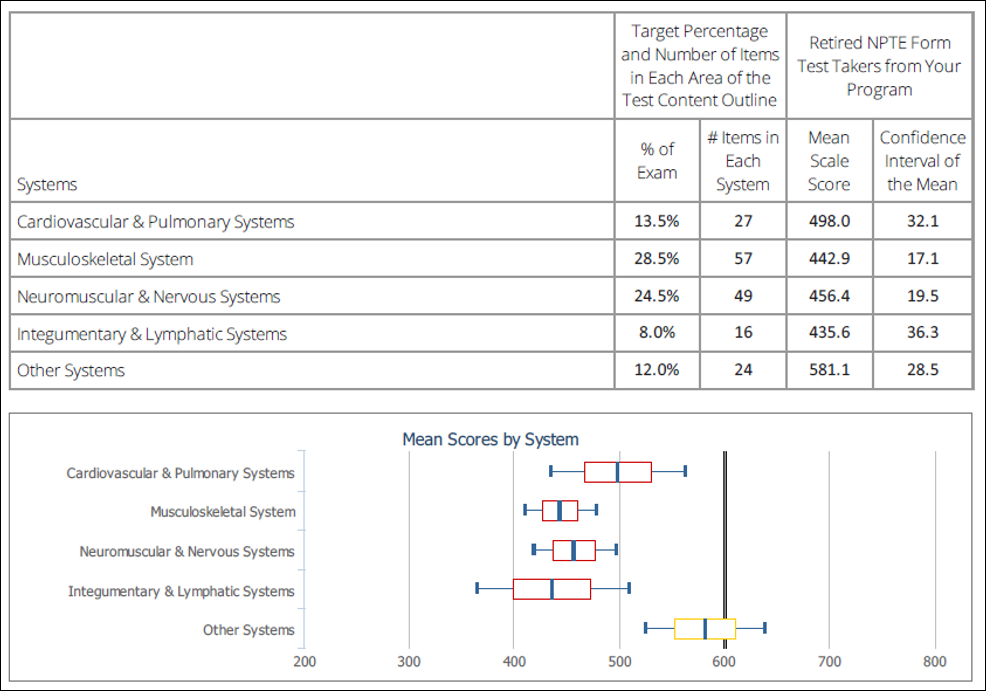This Quarter's Question
How can educators use the school score reports in Academic PEAT to help identify areas of weakness within a cohort and individual score reports to identify areas of weakness within candidates?
In 2018, more than 300 physical therapy education programs used Academic PEAT and FSBPT receives questions from educators about how to use this service and the associated score reports. This article aims to share guidance and improve understanding of the school and individual score reports generated by completion of the Retired NPTE examination form in Academic PEAT.
As you may know, Academic PEAT provides two timed, full-length practice examinations forms, which are different from the forms available for NPTE candidates to purchase directly from FSBPT’s website. When students complete the Retired NPTE examination form in Academic PEAT, score reports are generated for the school as a group and each student. That practice exam has “Retired” in the title (see image below). (For the sake of the clarity of the report, only Retired [“Form A”] results are included. Schools can review both cohort and individual student results from the Retired Form and Practice Form [“Form B”] through the school interface in the Academic PEAT Purchases area.)

Once the student group has completed the Academic PEAT Retired Form, educators have access to the school and individual score reports via the Educator’s dashboard. The cohort score report can show trends in the knowledge of a student group. Scores that are on track with the NPTE pass rate have a mean score of 600. In 2018, 99 percent of the PT candidates and 97 percent of the PTA candidates who scored 600 or higher on the retired form of PEAT went on to pass the NPTE on their first attempt. Score reports are broken out by content areas and by body systems. For instance, looking below at the sample school Academic PEAT score report by content area, an educator may decide to spend some additional time covering work activities related to “Foundations for Evaluation, Differential Diagnosis, and Prognosis” from the NPTE Content Outline, because the students, on average, did not surpass the 600 score. A score below 600 in a content area suggests the candidate’s overall chances of passing will be reduced by their performance in this area. Overall, the student group performed on track in the Physical Therapy Examination, Interventions, and Non-Systems Domains. Although it is unwise to ignore areas where the group, on average, did well, it is advisable to prioritize areas where the group average was low relative to the 600 standard.
Bear in mind that averages consist of many different test scores, so there may be students in the group who performed poorly in an area where the rest of the group did well. It is advisable to review each student’s score report, which we will discuss later in this article.
Additionally, the school Academic PEAT score report by systems can provide more specific information on weaknesses and strengths related to content on specific body systems. If the group overall is performing below the 600 mark, some type of review or remediation should be considered. An example of a school’s Academic PEAT score report by systems is shown below. This group was off track for all systems categories.

As mentioned previously, educators have the ability to look at each individual student’s score report for both the Retired (Form A) and Practice (Form B) examinations on Academic PEAT through the school interface in the Academic PEAT Purchases area. Reviewing the individual score report can be useful to provide customized advice and guidance to a student who is performing off track in areas that the rest of the cohort seems well prepared for. Retired Form scores comprising the group score report can be accessed directly by clicking on the “View” hyperlink as shown below in the Academic PEAT score report screen.
The individual student’s Academic PEAT score is reported in three different ways: by professional work activities (content area), by body systems, and by section.
The sample individual student Academic PEAT score report by Professional Work Activities below shows that the student performed off track in all categories.
However, the same student’s individual Academic PEAT score report by body system, shows on track performance in the cardiovascular & pulmonary, musculoskeletal, and other systems categories. The student was performing off track on questions related to the neuromuscular & nervous systems and integumentary & lymphatic systems. A review or remediation related to content and topics on those systems may help better prepare this student.
The individual student Academic PEAT score report will also show scoring by section as shown below. Scores by section should be interpreted with some caution as difficulty may vary slightly between sections. However, large shifts in scoring between sections may suggest impaired concentration or waning energy levels during the test.
For more information on interpreting candidate-level PEAT score reports, please take a look at the NPTE School Reports Interpretive Guide.
Back to Top